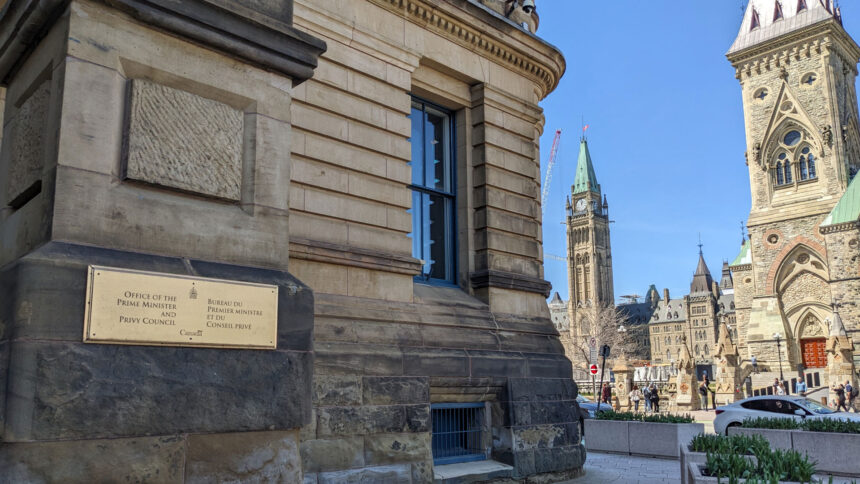Liberals and Conservatives passed a rare closure motion meaning that debate on Prime Minister Mark Carney’s controversial One Canadian Economy Act, or Bill C-5, will conclude by Friday despite serious concerns about Indigenous rights, climate protections and democratic process. The rush forced Assembly of First Nations (AFN) National Chief Cindy Woodhouse Nepinak, Inuit Tapiriit Kanatami President Natan Obed and President David Chartrand of the Manitoba Métis Federation to appear before the Senate Committee of the Whole just days after the legislation was introduced in the House of Commons. With fires raging across northern territories forcing Indigenous communities to evacuate, Woodhouse Nepinak reminded the Senate that many chiefs have been unable to respond while Parliament insists on “ramming something through in seven to 14 days” “ The world of 34 First Nations are literally burning up because of human-induced climate change,” she said. “There is no respite for affected First Nations to provide input or to consult with the Crown on this bill unless they can work the magic of protecting lives, getting on your witness list, to prepare and deliver a submission to you.” Woodhouse Nepinak noted she was forced to address the Senate committee without a resolution from chiefs, a departure from AFN protocol because there was no time to pass one. “ The honour of the Crown is not being upheld,” she told senators. “Deep consultation involves a two-way exchange of information sharing accompanied by substantive dialogue. It is more than merely inviting First Nations rights holders to speak for five minutes or to make written submissions.” “We ask this in a kind, good way. Rights holders from coast to coast to coast want to come to talk to you. Give them that respect.“ Read the proposed legislation: Bill C-5 All three leaders agreed the Carney government has mishandled the bill, which was only shared with “Indigenous partners” on June 6—ten days before the final debate. They called the Crown’s approach a breach of its constitutional obligations, treaty rights and the United Nations Declaration on the Rights of Indigenous Peoples (UNDRIP). “It has been Canada’s weakness that it pats itself on the back for being a great champion of Indigenous Peoples and upholder of the rule of law and the respect for Indigenous Peoples’ rights at the same time acting very differently through its legislation and through its practice,” said Obed. Obed urged Canada to rewrite the bill to include language that has been negotiated with Indigenous Peoples and pointed specifically to Article 19 of UNDRIP which requires states to obtain “free, prior and informed consent” (FPIC) before passing legislation that affects Indigenous peoples. He also reminded senators the government had recently committed to FPIC in its recent throne speech, yet that language is not in the bill. Obed added the bill should have a non-derogation clause to protect Constitutional rights and emphasized the need to incorporate recommendations from the National Inquiry into Missing and Murdered Indigenous Women and Girls—specifically, section 13, which addresses protections against gender-based violence linked to resource extraction projects. He said words in the bill that allegedly protect Indigenous rights are “thrown around in the bill as if they don’t have meaning. But they do have deep meaning.” Chartrand expressed support for economic development but echoed concerns about inclusion. He said Métis are ready to support national interest projects— but only if the implementation of Bill C-5 recognizes Métis treaties and prioritizes their full inclusion. “ We have land and shovel-ready projects and we’re prepared to invest part of our future land claim settlement into these projects,” said Chartrand. “We’ll support this legislation and we’re ready to walk side by side with Canada as well as the provinces and territories.” But Chartrand also stressed the need for clarity around the proposed Indigenous advisory body, which was mentioned in a government press release but not included in the text of the legislation. He questioned its intended role, authority, and whether it would have any real decision-making power. “ It doesn’t take rocket science for them to put a proper consultation process written in a form we can understand and private sector, the government, everybody understands. That should be easily done… that could be done overnight,” he said, adding the federal government is asking for too much trust, in leaving gaps in the legislation instead of including hard-won rights-based language. Carney is currently in Alberta hosting the G7 summit. Read More: Carney’s project threatens climate, democracy and Indigenous rights says Elizabeth May Several times during their presentations, Indigenous leaders were interrupted and made to wait, because of issues with sound and translation. Disruptions lasted more than a half hour. The One Canadian Economy Act will allow the federal Cabinet to select certain projects it considers of national interest. The minister in charge will be able to bypass key federal laws—including the Canadian Environmental Protection Act, the Indian Act, and the Impact Assessment Act without parliamentary oversight. Legal experts have dubbed sections 21 to 23 of the bill “Henry VIII clauses,” a term for provisions that enable governments to change laws by regulation—without returning to Parliament. The name is a pointed allusion to the infamous monarch who ruled by decree. “We need more time, we need to meet as chiefs-in-assembly. We ask for that support from this place,” pleaded Woodhouse Neepinak. Continue Reading
The honour of the Crown is not being upheld: Indigenous leaders tell prime minister to start again with Bill C-5

Leave a Comment










